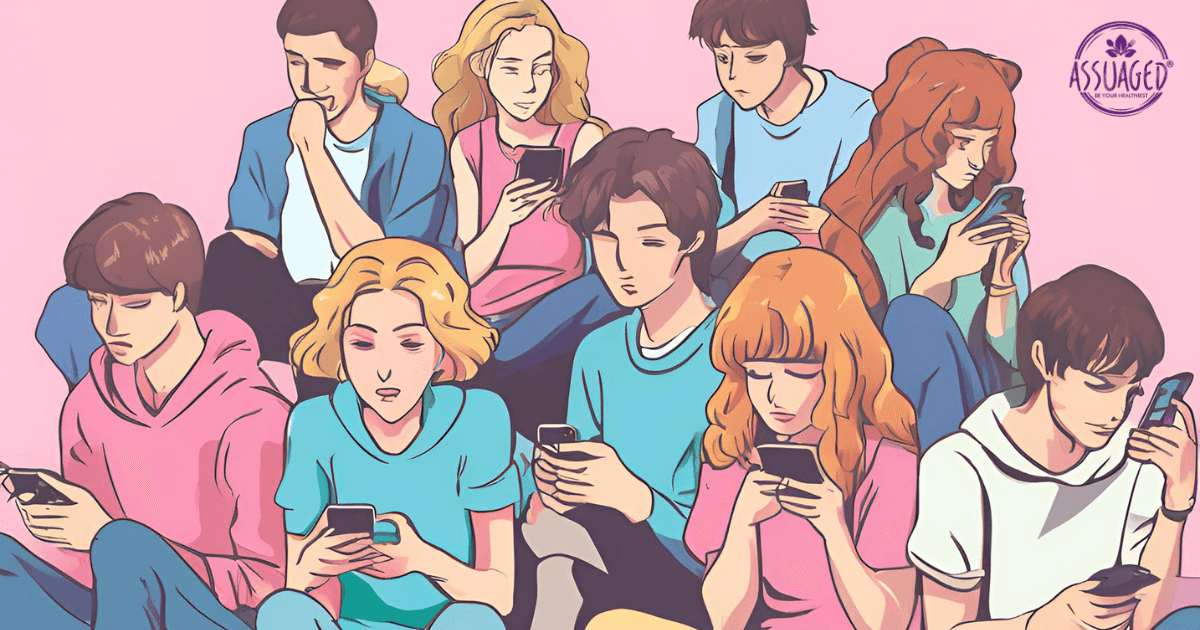Teen Smartphone Addiction: A Hidden Epidemic
As the parent of two lively teens, ages 13 and 14, I’ve had a front-row seat to the smartphone spectacle that unfolds daily in our home. These pocket-sized marvels are like magical portals, offering instant communication and a treasure trove of information at their fingertips. But, like any good story, there’s a twist – the lurking shadow of smartphone addiction. It’s no secret that teens are glued to their screens. From the moment they wake up to the time they go to bed, their smartphones are their constant companions.
Studies show that the average teen spends about 7 hours a day on their devices – that’s almost a full-time job! So, what’s behind this digital obsession? For starters, social media platforms are designed to be addictive, with endless scrolling and notifications that keep teens coming back for more. Add to that the allure of games, videos, and instant messaging, and it’s no wonder our teens are hooked.[1]
In this blog, we’ll dive into the frequency, causes, and effects of this modern-day phenomenon. So, buckle up and join me on this journey through the highs and lows of teen smartphone usage.

The Prevalence of Problematic Smartphone Usage (PSU)
Cell phone addiction, also known as problematic smartphone usage (PSU), is becoming more prevalent among teenagers. According to research and meta-analysis, about 23.3% of children and adolescents show signs of PSU. This alarming trend underscores the need for increased understanding and intervention strategies to fight this growing issue[2] .
Causes of Smartphone Addiction
Several factors affect teen smartphone addiction. These include:
Social Factors: Adolescents may spend more time on their phones due to peer pressure and the need to blend in with their peers. Social media platforms have an impact on this behavior.
Absence of Self-Control: Studies show that teenagers who have trouble controlling their behavior are more prone to developing a smartphone addiction. A lack of self-regulation can render it difficult to manage screen time effectively.[3]
Psychological Factors: Teenagers who experience significant levels of depression, anxiety, and stress are more prone to developing PSU. The persistent demand for social affirmation, along with the fear of missing out (FOMO), may worsen these psychological difficulties and lead to excessive smartphone usage.[4]
Consequences of Smartphone Addiction
Smartphone addiction has a significant negative impact on teenagers' mental and physical health. Overuse of smartphones has been linked to poor academic performance. Teens who are dependent on their phones may find it difficult to concentrate in class, which could lead to a decline in academic performance.
Excessive use of smartphones often leads to sleep disturbances, as the blue light emitted by screens can interfere with the body’s natural sleep-wake cycle. Additionally, smartphone addiction can contribute to mental health issues such as anxiety, depression, and increased stress levels due to constant connectivity and social media pressures. Physically, prolonged smartphone use can result in eye strain, neck pain, and poor posture.
Furthermore, smartphone addiction can negatively impact personal relationships and productivity, as individuals may become more isolated and distracted from real-life interactions and responsibilities. Addressing smartphone addiction requires a balanced approach, including setting boundaries and promoting healthy digital habits.[5]

Addressing Smartphone Addiction
Several tactics can be used to lessen the risks associated with smartphone addiction:
Mental Health Issues: PSU is associated with a greater risk of depression, anxiety, and perceived stress. Excessive phone use among teenagers has been linked to mental health issues, including poor sleep quality. Screens' blue light may alter sleep rhythms, resulting in insomnia and other sleep-related disorders.
Education and Awareness: Promoting responsible smartphone use habits and increasing public knowledge of the risks associated with smartphone addiction may aid in the decision-making of young people.
Parental Involvement: The involvement of parents is crucial in overseeing and managing their children's use of smartphones. Setting limits and supporting offline activities may help lower the likelihood of addiction.
Self-Control Training: Courses emphasizing time management and self-control techniques can aid in the treatment and prevention of smartphone addiction.
Encouraging teenagers to engage in activities beyond their phones can be both fun and beneficial. Indoor activities like baking and cooking allow teens to experiment with new recipes and cuisines, while board games and puzzles provide a great way to challenge the mind. Creative projects such as journaling, creating vision boards, or trying out painting and crafting can spark creativity. Reading and writing, whether diving into a good book or starting a short story, can improve literacy skills.
Outdoor activities like hiking, nature walks, sports, and games offer exercise and a chance to enjoy nature. Gardening teaches responsibility and provides a sense of accomplishment, while community service at local shelters or food banks can be fulfilling by giving back to the community.
Social activities such as picnics, BBQs, movie nights, and game nights with friends and family offer opportunities to socialize and have fun. Educational activities like online courses, DIY projects, and simple at-home science experiments can help teens learn new skills and explore their interests. These activities not only help develop new skills and build self-confidence but also provide a healthy balance to screen time.
Conclusion
Teenage cellphone addiction is a serious public health issue that must be addressed immediately. The prevalence of this problem is alarming, with a significant number of teenagers spending excessive amounts of time on their smartphones daily. This addiction is driven by various factors, including the allure of social media platforms, peer pressure to stay connected, and the constant availability of entertainment options. The effects of cellphone addiction on teenagers are profound and multifaceted.
Mentally, it can lead to increased anxiety, depression, and sleep disturbances. Physically, it can cause eye strain, poor posture, and a decrease in physical activity. Academically, it can result in lower grades and reduced academic performance. Socially, it can hinder the development of essential face-to-face communication skills. Understanding the prevalence, causes, and effects of this problem allows us to devise targeted interventions to encourage healthy smartphone usage among teens. These interventions can include educational programs, parental involvement, and school-based initiatives.
Continuous research and policy advice are required to handle this developing dilemma and assure future generations’ well-being. Policymakers must collaborate with researchers, educators, and tech companies to create a comprehensive strategy that addresses the root causes of cellphone addiction and promotes healthier habits. By taking these steps, we can help ensure that teenagers develop a balanced relationship with technology, ultimately safeguarding their mental, physical, and social well-being. Let's do our part to protect our teens!













